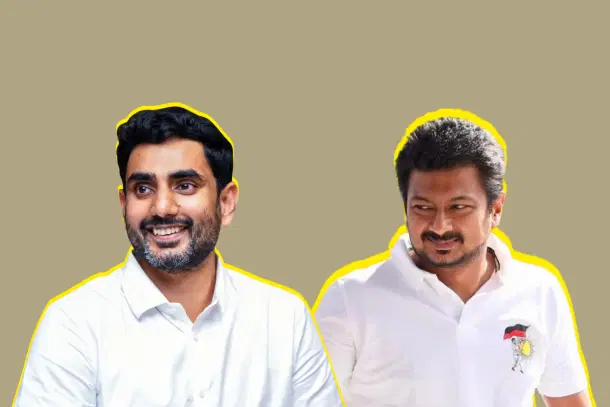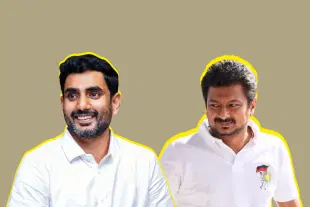Politics
How Udhayanidhi Stalin Falters Even As Nara Lokesh Finds His Stride
K Balakumar
Oct 23, 2025, 12:43 PM | Updated 12:43 PM IST
Save & read from anywhere!
Bookmark stories for easy access on any device or the Swarajya app.


If ever there was a week to underline the diverging fortunes of South India's dynastic politicians, this has to be it. In Andhra Pradesh, Nara Lokesh, the urbane son of Chief Minister Chandrababu Naidu, is making global headlines for roping in Google's data hub to Visakhapatnam, a partnership that may redefine the State’s tech landscape. Down south in Tamil Nadu, another dynast, this one with a far more entrenched surname, Udhayanidhi Stalin, is trending for all the wrong reasons.
The Tamil Nadu Deputy Chief Minister, and heir apparent to Chief Minister MK Stalin, allegedly reposted an Instagram post featuring a young actress. The post was swiftly deleted, but not before screenshots spread across social media. In a State where mainstream media remains conspicuously restrained in covering the ruling family's embarrassments, it was the digital grapevine that has turned it into a carnival of memes and mockery.
It was just a silly blip and not a major scandal, but sadly one that fits into a familiar and disturbing pattern. From controversial speeches to tone-deaf tweets, Udhayanidhi's digital footprint betrays a deeper absence of seriousness. Just days ago, in the dead of night around 1.30 am, he posted a promotional plug for the film Bison. Again, a trivial act, but in context, it spoke volumes about his misplaced priorities.
To be sure, posting about films or pets is not a crime, if it feels organic. But when a leader swings from fiery ideological pronouncements in the morning to flippant cinema plugs by midnight, it doesn’t suggest eclecticism, it merely screams confusion and reinforces the growing public perception that beneath the Deputy CM's fast-tracked political façade lies a bored middle-aged man.
Two sons, two scripts
Both Udhayanidhi and Lokesh inherited their political starts. Both are textbook examples of 'nepo kids'. Yet the difference lies in what they did next.
Lokesh, the Stanford-educated technocrat, stumbled in his first innings. His approach was termed gauche and his speeches lacked political polish. His 2019 electoral loss was humbling but not really surprising. But he chose the long road back. His Yuva Galam Padayatra, a 4,000-kilometre walk across Andhra Pradesh, transformed his image from an entitled heir to a grounded worker. His language of development, tech corridors, and digital employment now resonates with the aspirational middle class. His English-speaking ease may feel performative at times, but it helps position him as a reformer groomed for an era where articulation matters. And the Google deal is seen as a validation to his evolution as a seasoned politico and administrator.
Udhayanidhi, meanwhile, has rushed through his rites of passage at breakneck speed. From producer to actor to youth wing secretary to MLA, minister, and now deputy CM, all in barely five years. The speed with which he climbed is matched only by the lack of depth he displayed once he arrived. His portfolio of Youth Welfare and Sports should be a fertile ground for innovation, given Tamil Nadu's sporting culture. Instead, he is content riding on inherited momentum. (The chess Olympiad and the car racing on street circuit, merely built on existing structures, and they were not new ideas.)
The Peter Pan of Tamil politics
Udhayanidhi's public persona remains an awkward hybrid of film-world flamboyance and political immaturity. His infamous 'destroy Sanatana Dharma' remark brought him just national infamy but no intellectual weight. His offhand way of communicating, punctuated by hashtags like #RowdyTime with his dog, projects levity and immaturity at a time when the dog-related incidents have become a social issue. For someone in high office, such tonal dissonance undercuts credibility.
The Karur stampede tragedy last month was another case in point. His rushed flight from Dubai to Tamil Nadu seemed a performance of duty. His swift return abroad soon after exposed the hollowness beneath. Each incident, viewed alone, might be minor. But taken together, they sketch the portrait of a politician who confuses visibility with leadership.
To be fair, Udhayanidhi is not an isolated disappointment. The Karunanidhi lineage is showing clear signs of fatigue. Stalin himself, remarkably successful in the 2021 elections, has been more an able administrator's figurehead than an inspiring leader. He comes across as being dependent on bureaucrats and online image managers to sustain his aura. Kanimozhi, once seen as a potential cultural voice of the party, has faded into parliamentary ordinariness, surfacing occasionally with a stray statement. And Alagiri, once DMK's Madurai strongman, has long fallen into political oblivion.
Udhayanidhi's emergence, if anything, was meant to revive that fading charisma, and signal youth, energy, and continuity. Instead, he looks like a symptom of the same degeneration. Second-generation privilege with none of the first-generation passion.
And the clock is ticking
Elsewhere in the South, dynasts are redefining what inheritance should look like. KT Rama Rao in Telangana, even if now in the opposition camp in the State, built his own corporate-friendly, development-driven persona. Priyank Kharge in Karnataka has become a credible spokesperson for social and digital initiatives. Lokesh, once derided for his accent and awkwardness, has redeemed himself through results. The thing is, the difference is not birth but effort. The willingness to work for the legitimacy one is born into. Udhayanidhi, as of now, seems trapped in a bubble of inherited comfort.
His Deepavali 'greetings', couched in yet another needless display of anti-Hindu sentiment, lays bare the shallow provocations that seem to define his persona. Increasingly, Udhayanidhi comes across as a Bofors gun, just shoot and scoot. And by all available evidence, he seems incapable of any serious policy exploration or the articulation of ideas in major platforms, unlike Nara Lokesh or KT Rama Rao, who have shown substance and vision.
Udhayanidhi still has time though. He's young (in political terms), well-connected, and holds a powerful post. The DMk is still in the van and his elevation to the important chair in the State is not under real threat as his party has no real names to reckon with. But the window for transformation is narrowing. The public, even in Tamil Nadu's deeply dynastic political ecosystem, can sense the difference between competence and cosplay.
And so, if he wants to be more than just Stalin's son, he needs to step up and articulate ideas, own responsibilities, and show that he can lead, not just inherit. Because in the end, politics is not cinema. You can't rely on legacy scripts and star power. You have to earn your applause.
But right now, Udhayanidhi is muffing his lines.





